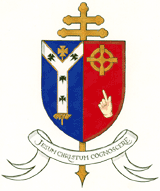 Commemorating the death, 300 years ago, of Archbishop Dominic Maguire, the Archbishop of Armagh and Primate of All Ireland, Archbishop Seán Brady, spoke of the need to have sensitivity and compassion for the millions of people who are uprooted and displaced in the world today.
Commemorating the death, 300 years ago, of Archbishop Dominic Maguire, the Archbishop of Armagh and Primate of All Ireland, Archbishop Seán Brady, spoke of the need to have sensitivity and compassion for the millions of people who are uprooted and displaced in the world today.Archbishop Dominic Maguire was the immediate successor, as Archbishop of Armagh, of the martyred St Oliver Plunkett.
“What strikes me about the life of Dominic Maguire was that it was one of persistent uprooting and migration and travel and turbulence, Archbishop Brady said.
“The Maguires and the O’Neills and the O’Donnells are today’s Sudan and Darfur and other oppressed regions of our world.”
Reflecting on his legacy, Archbishop Brady said that Archbishop Maguire, Catholic Primate at the time of the Battle of the Boyne, was a true “reconciler” and a “healer of memory” following the trauma of the martyrdom of St Oliver.
His commitment and skill at resolving conflict, reflected in his significant role in negotiating the Treaty of Limerick, still resonates to this day, he added.
“Events of that time, such the Battle of the Boyne, continue to affect politics in Ireland today. This is testament to the living power of memory,” Archbishop Brady said.
The Primate of All Ireland said that memory has a critical role in the healing of conflict, and emphasised that, as Christians, the Eucharist “cements and sanctifies our memory”.
Addressing the Irish College in Paris, he said: “The capacity of our memory to become a source of destruction is transformed in the Eucharist. It is here that we experience the immensity of God’s mercy. It is here that we encounter what St Paul described in the second reading as the ‘inexhaustible patience’ of the ‘love that is in Christ Jesus.’”
It is in the encounter with the boundless mercy and compassion of God that the healing of our most destructive memories becomes possible and we are able to forgive, he continued.
“As we prepare to celebrate the centenary of the Easter Rising and the Somme offensive … I am asking that we be sensitive and sensible about how we conduct these commemorations [to avoid them becoming] a deep well of hate and bitterness,” Archbishop Brady said.
He warned that young people, in particular, can be greatly influenced by the imagination and by experiences handed down from one era to another. He concluded: “We all have a responsibility to try and repair the disasters of the past. As followers of Christ, we know ourselves to be citizens of a broken world. But we are to play our part, here and now, in healing that broken world.
“We can do so with such things as our love, our respect and our pardon - our respect for each other.”
+++++++++++++++++++++++++++++++++++++++++++++++++++
Disclaimer
No responsibility or liability shall attach itself to either myself or to the blogspot ‘Clerical Whispers’ for any or all of the articles placed here.
The placing of an article hereupon does not necessarily imply that I agree or accept the contents of the article as being necessarily factual in theology, dogma or otherwise.
Sotto Voce
